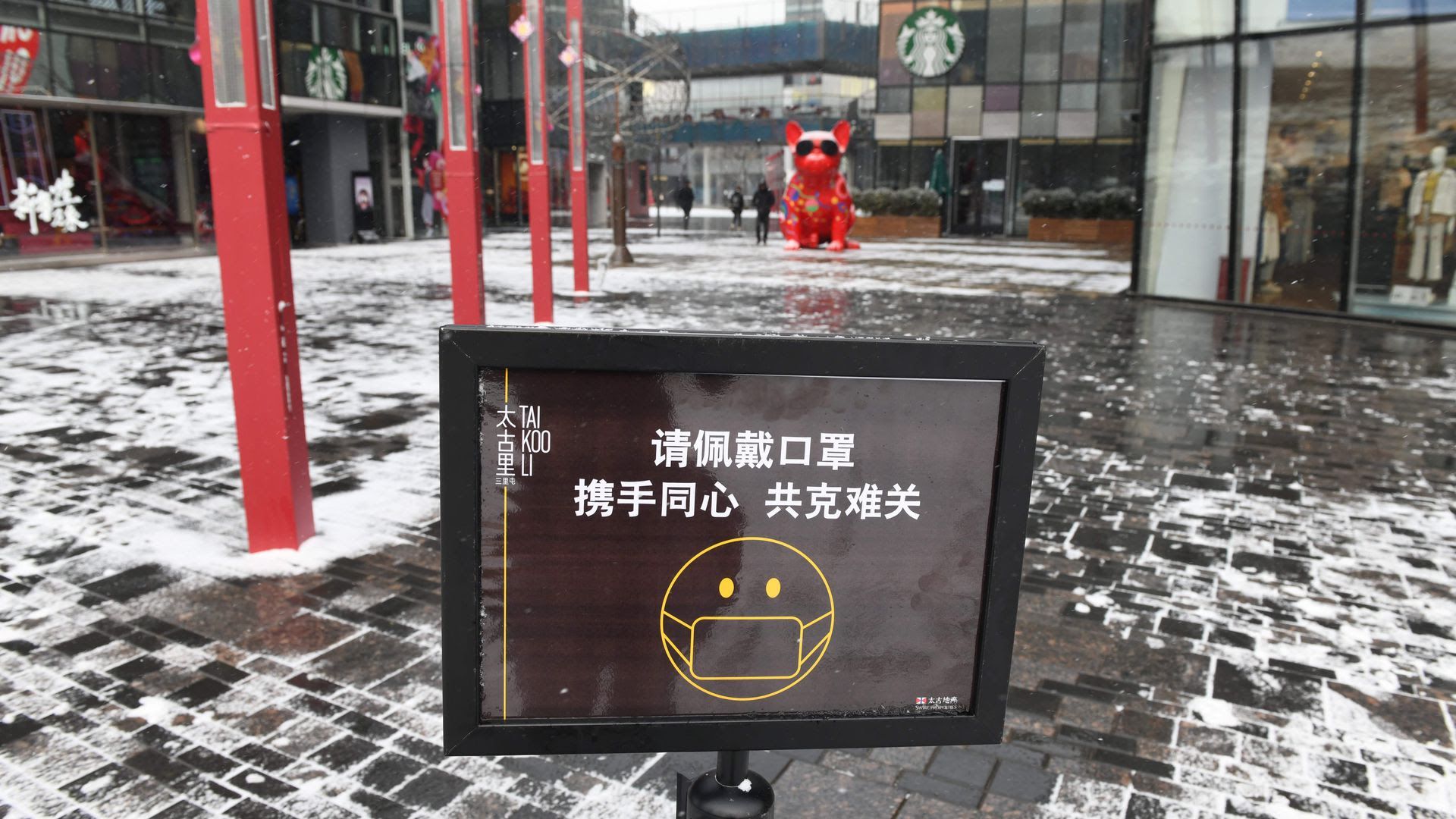The world's factory is still shut
Add Axios as your preferred source to
see more of our stories on Google.

A sign urges visitors to wear face masks at the entrance to an empty shopping mall in Beijing. Photo: Greg Baker/AFP via Getty Images.
Foxconn employees are being told to return to work in the Chinese cities of Shenzhen and Zhengzhou, but as of Monday only about 10% of them had done so, Reuters reported.
The state of play: The world's largest contract electronics maker, which produces Apple's iPhone, was supposed to be up and running along with much of the rest of the country on Monday.
- However, in major hub cities, streets remain empty, factories idled, and many workers are still stuck in their hometowns.
Why it matters: It was supposed to be liftoff day in China — the day the country reopened after closures from the Lunar New Year holiday were extended because of the novel coronavirus outbreak.
- The problems at Foxconn are emblematic of the issues that continue to plague China, and could hit U.S. companies and firms around the globe if Chinese factories don't start to open their doors soon.
What's happening: Authorities have locked down the region in central China around Wuhan, the epicenter of the outbreak, and plants for companies like Apple as well as Volkswagen, Qualcomm and Under Armour remain closed even in areas outside that region.
- “It’s like Europe in medieval times,” Jörg Wuttke, president of the European Chamber of Commerce in China, told the New York Times. "Where each city has its checks and crosschecks.”
- Agilian Technology CEO Fabien Gaussorgues told WSJ he isn’t sure if he will be able to get enough of his 80-person staff back to restart his factory.
- “We have warned our customers that air shipments might be impossible in the next three months,” Gaussorgues said. “Suppliers can’t commit to anything at this time. This is the No. 1 danger. It might force us to stop production.”
Between the lines: Apple and other multinational companies have a finite inventory of finished goods to sell, says DataTrek Research co-founder Nicholas Colas, estimating Apple's supply at "just 25–30 days" before it starts running out of iPhones if suppliers remain closed.
- "And even if facilities do get up and running, health protocols and absenteeism due to virus worries may reduce productivity," Colas warns.
The big picture: The coronavirus death toll has risen to more than 1,000 in China with the total number of cases now above 42,000.
- “Suddenly, an existential threat has come up, and many organizations are re-evaluating their supply chains,” said Renaud Anjoran, CEO of Sofeast Ltd., a China-focused quality assurance and engineering firm.
- He said thousands of small and midsize Chinese factories may shut as a result of the production shocks.
Traffic at U.S. ports is expected to drop significantly in February as China's slow return from the Lunar New Year holiday continues to put a damper on the global shipping industry.
By the numbers: February is forecast to decline 12.9% year over year, and March is expected to decline 9.5%, according to the Global Port Tracker report released yesterday.
- The report, by the National Retail Federation and Hackett Associates, shows forecasts for both months pared back significantly.
- The projections call for increased shipping in April, May and June. But, there's an overall decline this year from 2019's figures, which were down from a particularly robust 2018.
What they're saying: “Projecting container volume for the next year has become even more challenging with the outbreak of the coronavirus in China and its spread,” Hackett Associates founder Ben Hackett said.
- “It’s questionable how soon manufacturing will return to normal, and following the extension of the Lunar New Year break all eyes are on what further decisions China will make to control the outbreak.”
Go deeper:
